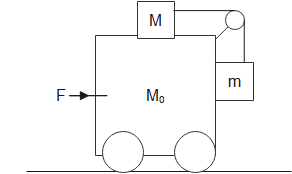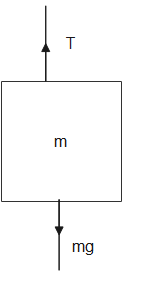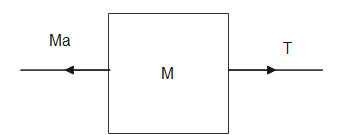Question
Question: Two blocks of mass capital M and small M are kept on the trolley whose all surfaces are smooth. Sele...
Two blocks of mass capital M and small M are kept on the trolley whose all surfaces are smooth. Select the correct statement.

1. If F=0 blocks cannot remain stationary.
2. For one unique value of F , blocks will be stationary.
3. Blocks cannot be stationary for any value of F because all surfaces are smooth
4. Both 1 and 2 .
Solution
For solving questions related to block and wedge, we need to understand how to draw a free body diagram of the bodies provided. In the given diagram we can see there are three bodies with a force F applied on mass M0. Thus, we can use Newton's second law of motion to equate the force.
Complete step by step answer:
We can see the two masses M and m are connected by a string. Let its tension be T. Let us draw the Free body diagrams of M, m and M0.
Now by drawing the free body diagrams, we can see that that tension T equals the weight of m.
Thus T=mg−−(1)

Now let the acceleration of the mass M be a. As the only force experienced by it is T (as the surface is smooth hence no friction), thus we can use Newton's second law of motion to equate the tension T.
Thus T=Ma−−(2)

Hence from 1 and 2: a=Mmg−−(3)
Now as the applied force on the whole system is F, thus acceleration of system a′ will be: a′=m+M+M0F−−−−(4.
But we see in the question, we have to find when the blocks will move together, thus a′=a.
Hence from equation 3 and equation 4 we see:
F=Mmg(M0+M+m) .
Now by checking each of the given options we see that:
Now by seeing the options we see only option 1 is correct.
This is because if F=0, then a' = 0 , but there is an acceleration a which is non zero, thus blocks move.
The second option is correct because there is a value of force for which both accelerations are equal, thus the blocks remain stationary.
Blocks cannot be stationary is a wrong statement because there is a value of force for which they are stationary.
Thus, we see that two options are the correct,
Hence the correct answer is option 4.
Note: These types of questions are based on the combined application of tension, Newton's laws of motion. Just drawing the free-body diagrams would solve the problem. Remember the important condition that all the bodies move with equal acceleration.
